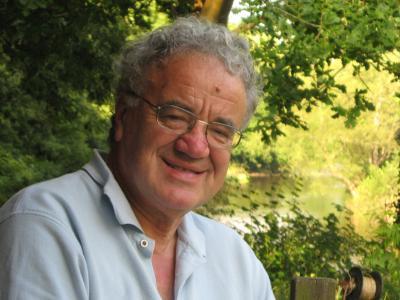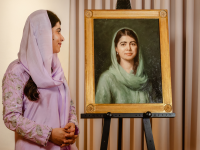
Clive Anthony Holmes (10 November 1943 – 25 July 2022)
LMH is sad to announce the death of Clive Holmes, Fellow and Tutor in History from 1987 to 2011. He was 78. Clive was an historian of tremendous skill and huge range, a scholar who lent distinction to the college rather than deriving status from it. He was also a great servant of the common weal, holding a number of college offices, perhaps most substantially as a notably successful admissions tutor. In the wider world, he was also elected to the Council of the Royal Historical Society in 2004. But he would wish to be remembered most as a teacher.
'...in my admittedly slight acquaintance with the college I felt very much at ease there. I sense that it is a place where I could make a real contribution as a teacher, and enjoy myself doing it.'
(Clive Holmes to Principal Duncan Stewart, 7 Dec. 1985: LMH Archives)
Clive was 43 and a scholar of international reputation when he took up his appointment at LMH in January 1987. He began his career in Cambridge before moving to Cornell University in Upstate New York. This reputation was partly the result of his first monograph, The Eastern Association in the English Civil War (1974), which brilliantly analysed the politico-military-religious entity which incubated the career of Oliver Cromwell, and helped lay the groundwork for Parliament's victory over Charles I.
But Clive's renown was also the product of an unusually wide range of serious scholarly interests emanating from what a referee accurately described as 'an extremely interesting and fertile historical mind'. His work on the Eastern Association led on to other studies of local political units, notably Seventeenth-Century Lincolnshire (1980), and of aspects of East Anglian society, especially fen drainage, with all its social tensions, economic motivations, and political flashpoints. Such work left him sceptical - one of Clive's defining traits - of the fashionable 'county community' thesis which had held sway through much of the 1960s and 1970s, and which held that early modern England was less a cohesive nation state than a loose confederation of localities whose inhabitants tended to look inward. This was duly demolished in a slashing review piece, 'The County Community in Stuart Historiography' (Journal of British Studies, 1980), that heralded a turning of the scholarly tide. Good archival resources at Cornell had also made him interested in the history of early modern witchcraft. Nevertheless, when pressed, he viewed himself first and foremost as an historian of early modern law, never wavering from a belief in early modern lawyers as purveyors of self-interested cant, and their modern successors as absurdly prone to romanticise their forbears' lucrative endeavours. It is sad that he never completed his great book on the early modern Court of Chancery - an exceptionally demanding subject which only he could have brought off in style - but he wrote with distinction on many other legal subjects. It was fitting that his last undergraduate lecture for a large outline paper addressed the forbidding topic of 'Law and Legal Institutions in Early Modern Europe'. The applause at the end was intense, and prompted by a palpable sense of respect rather than relief.
Clive rapidly established himself as one of the greatest Oxford tutors of his generation in any subject and at any college. This was not a surprise: his referees for the LMH post emphasised his reputation at Cornell as a teacher, not least having won that university's Clark Prize for 'excellence in teaching' in 1975. Charismatic and inspiring, he was equally able to spur on the most ambitious students to greater achievements, and to support and encourage the less able to fulfil potential they did not know they possessed. Tutorials with Clive expanded the frame of what had initially seemed possible and led students to see problems in new and more fruitful ways. He possessed the unusual ability to be a terrifyingly acute critic of his peers' and seniors' published work, and yet always to see the best in students' essays and tutorial contributions. The nuggets of gold were extracted from the dross, polished up into better forms, and redeployed. Underlying the whole tutorial experience was an indefinable human wisdom that allowed him to 'read' students' characters and anxieties as a personal tutor of true kindness. In return, he inspired great loyalty in others. Many of his pupils stayed in touch with him throughout their post-Oxford lives. When he retired in 2011 a major conference was organised in his honour, and its proceedings were subsequently printed as a Festschrift: Revolutionary England, c.1630.c.1660 (2016) - almost all the contributors were former pupils. They could each testify to the extraordinary ability that led to his being given an Oxford University teaching award in 2005, the first year the scheme ran.
Clive's priority whilst in post was teaching, but he still published work of uncompromising quality, often stimulated by his experiences working with undergraduate and graduate students. He and his wife, Felicity Heal, ran for many years a highly successful optional subject 'Nobility and Gentry in England, 1560-1660' ,which led to a shared monograph, The Gentry in England and Wales, 1500-1700 (1994). His continued interest in early modern witchcraft and the law led to essays in Past and Present and leading international collections. Alongside Robin Briggs and Lyndal Roper he established an optional subject on witchcraft and witch-hunting that still runs today. Yet his scholarly centre of gravity remained in the mid-seventeenth century, and he came to enjoy engaging in controversy with other leading lights, whether over the character of Charles I and his government, or the nature and purpose of the king's trial in 1649. Perhaps because of its title and relatively brief length, Clive's Why Was Charles I Executed? (2006) has never received the plaudits it deserved, although it represented the distilled wisdom of more than twenty years' teaching of a third-year special subject, 'Commonwealth and Protectorate, 1647-58', that inspired many scholars of the next generation to go on and research in the field. Perhaps he made it look too easy: in reality, the book had been worried over and re-written multiple times.
In retirement Clive enjoyed more time for research, publishing almost as much in the decade following 2011 as in the previous two. This included a number of witchcraft essays, notably an influential pamphlet for the Historical Association on Why Did the Prosecution of Witches Cease in England? (2013). But for all the pleasures of publishing he missed regular teaching profoundly and always enjoyed meeting younger scholars. He valued himself primarily as a tutor and was always clear that he regarded living on in his pupils as the best possible legacy. It is striking how much he retained his zest for teaching right to the end of his career in post. As one student feedback form notes about the experience of being taught by him in Hilary Term 2011, his penultimate term in college: 'Best tutorials I have ever had and the best tutor.'
Clive loved walking in the gardens of LMH, most of all along the river, hoping for a glimpse of the generally elusive Kingfisher. Many alumni will remember his laughter, his support in difficult times, and his genuine delight in their successes. He will be sorely missed.
Clive Holmes: A Personal Appreciation by former student and colleague Grant Tapsell
No one ever sat in a chair more vigorously than Clive. I can see him now, poised on the edge of his seat whilst teaching, leaning forward, arm outstretched, ready at any moment to leap up and fetch a book down from the shelves. The air crackled with energy. It also tended to be full of the sound of laughter, whether about the intellectual blunders of leading figures in the field, student scandals, or recent events in college. Clive was the main reason I applied to LMH, prompted by a wise schoolteacher, and I always offered up thanks for the brilliant advice - even if Clive christened me 'Eeyore' within about five minutes of my arrival. It is immensely hard to accept that such a vital and vibrant figure is no longer here. The reality is that we were lucky to have him for so long: a cancer diagnosis in 2001 led to debilitating treatment and substantial surgery. He lived his life thereafter with immense determination, even when in recent years his physical problems multiplied manifold. There was a tremendous motor within him, powering him on and sustaining him to live a full life long after others would have retreated to their homes.
Clive was a truly exceptional tutor with a boundless capacity to inspire those he taught. He balanced a forensic scepticism with a warm regard for anyone who was 'sensitive' - a favourite word - to the nuances of the evidence. Overstating a case was crass, but failing to make any case at all was worse. It was refreshing to be taught by someone so immune to fashionable impulses within the profession: Clive had absolutely no interest in the pursuit of novelty for its own sake. He hated bullies and held show-boaters in thinly-veiled contempt. He was a pessimist who forced himself to play the role of an optimist for the benefit of his students; a man of deep passions who successfully restrained a powerful temper except under the greatest provocation. He was a mesmerising lecturer, who interacted with his audience to mould his message in the delivery, even though he got up impossibly early to re-write his lectures from scratch every time he gave them. He possessed the skills of an academic alchemist, contriving to turn the most boring subjects - fen drainage, the legal system, heraldry - into golden topics of interest. He was also unusual in the sense that he was a brilliant tutorial teacher without being particularly dewy-eyed about Oxford college life. He was a Faculty man, giving freely of his time to be a chair of examiners, a vigorous schools liaison officer, and a brilliant organiser of the admissions exercise. His gifts as a graduate supervisor were extensions of his wider tutorial brilliance: he truly cared about his students, and balanced the most searching critiques of their written work with adamantine support for their projects, careers, and lives.
In the twenty-eight years between our first and last meeting he was one of the central points in my universe and a key part of what made LMH and Oxford extraordinary, memorable, and inspirational for me. I know that many others would say the same. I will miss the bone-crushing hugs, irreverent lunches, and wise counsel. I think of him ringing me to tell me my Finals results; attending my wedding; chatting with my son. I regret all the questions I never got round to asking, and the British reserve that prevented me from ever truly articulating what he meant to me. I hope he knew. Clive enriched the lives of his students and more truly embodied what is to be an Oxford tutor than anyone else I have ever met.
Grant Tapsell (1995; Fellow 2011-)


